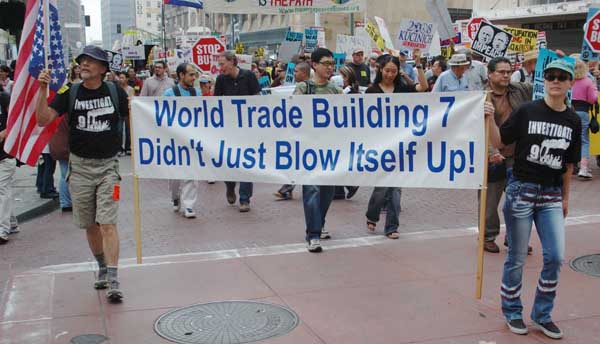
CONCLUDING PART
Does the `blowback? paradigm explain 9/11?
Truth-ers disagree
By rahnuma ahmed

Before launching into my discussion of the `blowback? paradigm, let?s take a quick look at the findings from a new poll of New Yorkers: ?36% want a new investigation of the collapse of Building 7.
Apparently, 1 in 3 New Yorkers are unaware of Building 7?s collapse; ?but, of those who are, ?24% believe it was a `controlled demolition.?
Not `fire?, as the National Institute of Science and Technology?s 2008 report claims: ?[Building 7 is] The first known instance of fire [in history] causing the total collapse of a tall building.? NIST termed it `a new phenomenon.?
Conducted by the independent Siena Research Institute, the poll was commissioned by Remember Building 7, an advocacy campaign calling for a new investigation of the 47-storey skyscraper, which collapsed on 9/11.
36 percent of all respondents are inclined to believe critics — among them are Architects and Engineers for 9/11 Truth (AE911Truth), which has gathered over 1,500 signatures from architects and engineers — who say the government?s account of Building 7?s collapse is `physically impossible.?? Its fall, maintain these architects and engineers who have professional experience in designing and building skyscrapers, was caused by `controlled demolition.?
36 percent of those polled say, we are `not satisfied that we know the whole truth about that day, and it is time to get to the bottom of what happened.?
The `whole truth? and `getting to the bottom of what happened? is inextricably linked to paradigms. What was it that Thomas Kuhn had said of paradigms?.? it constitutes the underlying assumptions and intellectual structure upon which research and development in a field of inquiry is based (The Structure of Scientific Revolutions, 1962). Others have spoken of it being an interpretative framework, one which is guided by a set of beliefs and feelings about the world and how it should be understood and studied (Egon G. Guba ed, The Paradigm Dialog, 1990).
`Blowback? — explains professor Chalmers Johnson, author of the trilogy Blowback (volume 1 published in 2001), an academic for 30 years who also worked as a consultant for the CIA (1967-1973) but later became best known for his powerful critique of American imperialism — is a CIA term. It means retaliation or payback. `By blowback we do not mean just the unintended consequences of events. We mean unintended consequences of events that were kept secret from the American public, so that when the retaliation comes, they have no way to put it into context. Just as after 9/11, you have the president saying, “Why do they hate us?” The people on the receiving end know full well that they hate us because of what was done to them. It’s the American public that are in the dark on that subject? (interviewed by Harry Kreisler, January 29, 2004). Continue reading “CONCLUDING PART: Does the `blowback? paradigm explain 9/11?”

